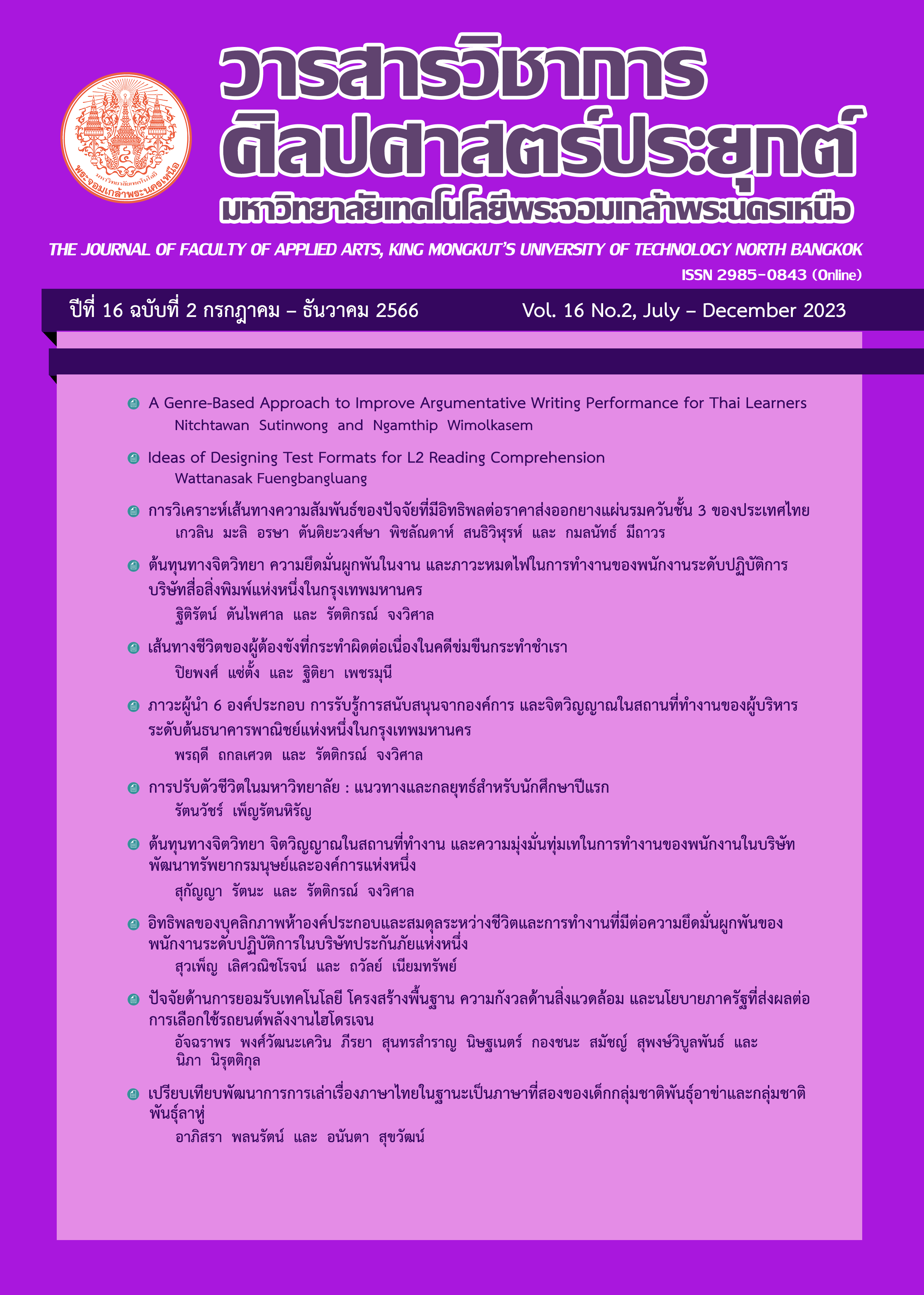แนวทางการสอนแบบอรรถฐานเพื่อพัฒนาความสามารถด้านการเขียนเชิงโต้แย้งสำหรับนักศึกษาไทย ไม่มี
Main Article Content
บทคัดย่อ
บทคัดย่อ
บทความนี้แสดงการใช้การสอนแบบอรรถฐานและลักษณะทางภาษาเพื่อส่งเสริมให้ผู้เรียนพัฒนาความสามารถด้านการเขียนเชิงโต้แย้งได้อย่างมีประสิทธิผล งานวิจัยนี้มีวัตถุประสงค์เพื่อพัฒนาความสามารถด้านการเขียนเชิงโต้แย้งสำหรับนักศึกษาไทยโดยใช้แนวทางการสอนแบบอรรถฐานมุ่งเน้นประเด็นหลักเพื่อการสื่อสารและรูปแบบงานเขียนที่เป็นระบบซึ่งมีรายละเอียดของลักษณะทางภาษาตามรูปแบบของการเขียนเชิงโต้แย้ง ผู้เรียนเป็นนักศึกษาจากสถาบันเทคโนโลยีไทย-ญี่ปุ่น การสอนเชิงอรรถฐานเพื่อการเขียนเชิงโต้แย้งประกอบด้วย 4 ขั้นตอนคือ 1) การนำเสนอรูปแบบ 2) ขั้นการเขียนร่วมกัน 3) การวิเคราะห์ และ 4) ขั้นการเขียนโดยอิสระ การเก็บข้อมูลได้มาจากงานเขียน 120 ชิ้นของนักศึกษาและวิเคราะห์ด้วยแนวทางปริจเฉทวิเคราะห์พบว่านักศึกษาส่วนใหญ่สามารถพัฒนาความสามารถด้านการเขียนเชิงโต้แย้งเป็นไปตามเป้าหมายที่ตั้งไว้ อย่างไรก็ตามยังมีประเด็นที่ยังเป็นปัญหาได้แก่การจัดการเนื้อความและลักษณะทางภาษาบางประการ
Article Details

อนุญาตภายใต้เงื่อนไข Creative Commons Attribution-NonCommercial-NoDerivatives 4.0 International License.
1.บทความที่ตีพิมพ์เป็นลิขสิทธิ์ของวารสารวิชาการศิลปศาสตร์ประยุกต์ การนำเนื้อหา ข้อความหรือข้อคิดเห็น รูปภาพ ตาราง ของบทความไปจัดพิมพ์เผยแพร่ในรูปแบบ ต่าง ๆ เพื่อใช้ประโยชน์ในเชิงพาณิชย์ ต้องได้รับอนุญาตจากกองบรรณาธิการวารสารอย่างเป็นลายลักษณ์อักษร
2.ข้อความที่ปรากฏในบทความแต่ละเรื่อง เป็นความคิดเห็นส่วนตัวของผู้เขียนแต่ละท่านไม่เกี่ยวข้องกับวารสารวิชาการศิลปศาสตร์ประยุกต์ และบุคลากร คณาจารย์ท่านอื่น ๆ ในวารสารฯ แต่อย่างใด ความรับผิดชอบองค์ประกอบทั้งหมดของบทความแต่ละเรื่องเป็นของผู้เขียนแต่ละท่าน หากมีความผิดพลาดใด ๆ ผู้เขียนแต่ละท่านจะรับผิดชอบบทความของตนเองแต่ผู้เดียว
เอกสารอ้างอิง
Chalermnirundorn, N. (2002). Motivation and language learning among Thai students: a case study of the type of motivation that influences students of English as a foreign language. (Master degree, Graduate Programs of Education, AU).
Chen, Y. S., & Su, S. W. (2012). A genre-based approach to teaching EFL summary writing. ELT journal, 66(2), 184-192.
Cheng, A. (2008). Analyzing genre exemplars in preparation for writing: The case of an L2 graduate student in the ESP genre-based instructional framework of academic literacy. Applied linguistics, 29(1), 50-71.
Cohen, L., Manion, L., & Morrison, K. (2007). Research methods in education. Routledge.
Christie, F. (1999). Genre theory and ESL teaching: A systemic functional perspective. Tesol Quarterly, 33(4), 759-763.
Derewianka, B. (1990). Exploring how texts work. Heinemann.
Dueraman, B. (2012). Teaching EFL writing: Understanding and rethinking the Thai experience. Journal of alternative perspectives in the social sciences, 4(1), 255-275.
Hammond, J., and B. Derewianka (2011). "An introduction to genre." The ELT handbook. Cambridge: CUP (2011).
Hyland, K. (2002). Directives: Argument and engagement in academic writing. Applied linguistics, 23(2), 215-239.
Hyland, K. (2003). Genre-based pedagogies: A social response to process. Journal of second language writing, 12(1), 17-29.
Hyland, K. (2004). Genre and second language writing. University of Michigan Press.
Hyland, K. (2008). Genre and academic writing in the disciplines. Language Teaching, 41(4), 543- 562.
Hyon, S. (2018). Introducing genre and English for specific purposes. Routledge.
Johns, A. M. (2011). The future of genre in L2 writing: Fundamental, but contested, instructional decisions. Journal of Second Language Writing, 20(1), 56-68.
Ling, M. (2001). How can genre via process approaches support the teaching of EFL writing? Thai TESOL Bulletin, 14(2), 53-58.
Moskowitz, H. R. (1999). Perceptual changes in taste mixtures. Perception & Psychophysics, 11(4), 257-262.
Myskow, G., & Gordon, K. (2010). A focus on purpose: Using a genre approach in an EFL writing class. ELT journal, 64(3), 283-292.
Negretti, R., & McGrath, L. (2018). Scaffolding genre knowledge and metacognition: Insights from an L2 doctoral research writing course. Journal of Second Language Writing, 40, 12-31.
Praneenararat, P. (2019). Developing English Speaking Ability and Learning Engagement by Lessons based on Genre and Humanistic Approaches for Thai EFL Adolescent Learners. (Doctor of Philosophy in English Language Teaching, AU).
Reppen, R. (2010). Using corpora in the language classroom. Cambridge University Press.
Rodsawang, S. S. (2017). Writing problems of EFL learners in higher education: A case study of the Far Eastern University. FEU Academic Review, 11(1), 268-268.
Tomlinson, B., & Masuhara, H. (2018). The complete guide to the theory and practice of materials development for language learning. John Wiley & Sons.


